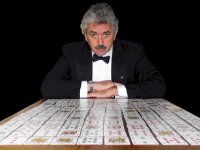Every Child Can Win the Memory Game
Your content has been saved!
Go to My Saved Content.As a student, I had great difficulty concentrating during lesson time and consequently didn't retain much knowledge. I was diagnosed with dyslexia and had the symptoms of attention deficit disorder. Academic information just didn't get through to me. Here are samples of reports that my teachers sent home when I was ten:
- "He tends to dream in the middle of a calculation which leads him to lose track of the thought."
- "Has not paid much attention. Appears to know more of the Universe than the Earth." (This was a veiled reference to daydreaming from my Geography teacher.)
- "Terribly slow. Often cannot repeat the question. Must concentrate."
- "Unless Dominic really shakes himself up and gets down to work, he is not going to achieve any success . . . he is painfully slow."
The comments contained no evidence that I would one day become an eight-time World Memory Champion and author of over a dozen books and courses on memory training. So what happened?
In 1987, aged 30, I watched a man on television memorize a shuffled deck of playing cards in just under three minutes. As corny as it may sound, that moment changed my life.
I taught myself to memorize playing cards and realized that the strategy I was developing could be used to remember anything. Today, when I appear on TV and radio shows all over the world, one question is always asked: "Why don't they teach this stuff in schools?" Had I acquired those skills when I was at school, I would have achieved exam success, gone onto higher education, and actually enjoyed the learning process. Instead, I suffered low self-esteem and dropped out of school when I was 16.
Schools Memory Championships
In 2008, I co-founded the U.K. Schools Memory Championships along with Tony Buzan, the inventor of mind-mapping, and chess Grandmaster Raymond Keene. Rather than just going into a school and entertaining students with a few memory tricks, the aim was to embed powerful memory techniques into the minds of students by getting them to play "The Game of Memory" for themselves. These memory workshops are proven to boost young people's self esteem, confidence and motivation to learn, and they provide tools to help improve overall achievement and exam performance.
Thinking back to when I was at school, I don't recall a single lesson devoted entirely to the subject of memory. I can vaguely remember being given the acronym "Richard Of York Goes Battling In Vain" to remember the colors of the rainbow, but that was about it.
Having helped establish the teaching of memory skills the U.K. schools, I now find it completely illogical to expect a child to learn any subject without first teaching how to learn and how to remember.
Teaching Basic Memory Skills
Here are five strategies that will help students remember academic information:
1. The Story Method
To remember a set of information, create a story that links all the elements together. In chemistry, for example, the noble gases are helium, neon, argon, krypton, xenon and radon. Imagine taking off in a helium balloon lit up with a neon light. An argon welder turns into Superman, who takes you to the planet Krypton, and so on.
2. Numeral Shapes
To remember numerical information, give each numeral a picture code. For example, 2 is shaped like a swan, and 9 resembles a balloon and string. To remember that Queen Victoria had nine children, imagine her holding a balloon and string.
3. The Link Method
To remember foreign vocabulary, find a link between the sound of a foreign word and its meaning. For example, the German word for "bone" is knochen, so imagine the pain involved in "knocking" a bone in your leg. You can remember the Spanish word for "boat" – barco -- by imagining that a boat has a large "barcode" on its side, or picture a dog "barking" on a boat.
4. The Journey Method
To remember a list, choose a familiar journey, maybe around your house, and picture each item on the list at specific locations. Test your class with a random list of 20 objects, then get them to imagine each item along a 20-stage route around their house. The same method can then be applied to remembering practical information such as the Periodic Table of Elements or the U.S. presidents.
5. The Rule of Five
To avoid having information gradually fade from your memory banks, it's important to know when to review information. Apply the Rule of Five:
- First review: immediately
- Second review: 24 hours later
- Third review: one week later
- Fourth review: one month later
- Fifth review: three months
Tapping the Potential
To date, I have taught over 10,000 schoolchildren basic memory skills. Typically, I get a volunteer to write down and call out a random 60-digit number, which I then repeat forwards and backwards having heard the number just once.
The faces register amazement. However, the real payoff is when I ask, "Would you like to be able to do that, too?"
"Yeeeeeeeees!"
Next, we discuss how easy and fun learning could be if they knew the secret. After all, if a dyslexic kid can go on to become a World Memory Champion, then all children are potential memory champions.
